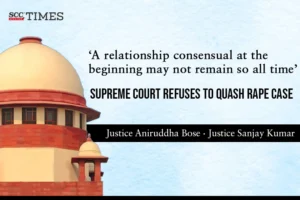Supreme Court: In a petition under Article 136 of the Constitution of India seeking to quash a First Information Report (‘FIR’) under Sections 342, 354, 366, 376(2)(n), 312, 201, 420, 506 and 509 of the Penal Code, 1860 (‘IPC’) and Sections 66(E), 67 and 67(A) of the Information Technology Act, 2000 (‘IT Act’), Division Bench of Aniruddha Bose and Sanjay Kumar, JJ. Refused to interfere with the High Court’s dismissal of petition for quashing the FIR stating that the same did not lack ingredients of the offences alleged.
The said FIR was lodged at the instance of a woman who apparently had a relationship with the petitioner, which soured later. There were several allegations and cross allegations against each other. The Karnataka High Court dismissed petition under Section 482 of Criminal Procedure Code, 1973 (‘CrPC’) dealing with nature of allegations against the petitioner and placing reliance upon Abdul Majid Sab v. State of Karnataka, 2009 SCC OnLine Kar 331 for similar facts.
The Court pointed towards the various offending acts alleged to have been committed by the petitioner, which were alleged to be a counterblast to the petitioner’s complaint of blackmailing/extortion against the woman.
The Court expressed that it could not be said that the FIR did not disclose any offence, and the allegations could not be held to be inherently improbable, being one of the grounds for quashing an FIR as per State of Haryana v. Bhajan Lal, 1992 Supp (1) SCC 335.
While considering the counsel’s contention that consensual relationship could not give rise to an offence of rape, the Court pointed towards the instant facts stating that “the allegations do not demonstrate continued consent on the part of the complainant. A relationship may be consensual at the beginning but the same state may not remain so for all time to come. Whenever one of the partners show their unwillingness to continue with such relationship, the character of such relationship as it was when started will not continue to prevail.”
The Court expressed that the instant relationship did not remain consensual to justify quashing of the criminal complaint at the threshold, nor the complaint lacked the ingredients of the offences alleged. Therefore, the Court refused to interfere with the High Court’s impugned order and dismissed the instant petition. Considering the nature of allegations made by the said woman, the Court directed masking of her identity in the Court records and future proceedings and her to be referred as ‘Miss X’.
[Rajkumar v. State of Karnataka, 2024 SCC OnLine SC 257, Order dated 5-03-2024]
Advocates who appeared in this case:
For Petitioners: Senior Advocate Vinay Navare, Advocate Chinmay Deshpande, Advocate Manjunath K, Advocate on Record Anirudh Sanganeria
For Respondents: Additional Advocate General Muhammad Ali Khan, Advocate on Record V.N. Raghupathy, Advocate Manendra Pal Gupta, Advocate Omar Hoda, Advocate Uday Bhatia, Advocate Eesha Bakshi, Advocate Kamran Khan, Advocate on Record Namit Saxena, Advocate Shaurya Rai

